- Introduction
- Understanding Anxiety
- Defining Anxiety: The Invisible Storm
- The Ripple Effect: Symptoms and Impact
- The Anatomy of Anxiety: A Deeper Insight
- Conventional Treatments for Anxiety: The Traditional Path
- The Role of Complementary Therapies: A Holistic Approach
- The Unspoken Dialogue: Mind-Body Connection
- The Path Ahead: Exploring New Horizons
- The Essence of Thai Massage
- A Journey Through Time: The Roots of Thai Massage
- The Dance of Healing: Techniques and Modalities
- Thai Barefoot Massage: A Unique Twist
- The Sen Lines: Pathways to Wellness
- Thai Massage in the Modern Era: Adapting Tradition
- Beyond Physicality: The Psychological Dimensions
- Thai Massage: A Tapestry of Healing
- Thai Massage and Mental Well-being
- Specialized Thai Massage Services for Anxiety
- Complementary Services at Mai Thai Massage
- Practical Considerations
- Conclusion
Introduction
In an era where the quest for mental well-being is as crucial as physical health, Thai massage emerges as a beacon of holistic healing. Traditional yet evolving, this ancient practice is more than just a series of stretches and strokes; it’s a journey into the realm of relaxation and mental tranquility. This article, “Exploring the Calming Effects of Thai Massage: A Comprehensive Guide to Easing Anxiety,” delves into the intricate relationship between Thai massage and anxiety management.
Anxiety, a silent storm that rages within, affects countless individuals worldwide. Its invisible clutches can alter life’s rhythm, turning harmony into dissonance. Amidst various therapeutic interventions, Thai massage stands out, not just as a physical regimen, but as a harbinger of mental peace. But how does this age-old practice intersect with the complexities of anxiety? Can the methodical kneading of muscles and the guided stretching of limbs truly unwind the tangled threads of anxious thoughts?
This guide embarks on an exploratory journey through the meandering pathways of Thai massage and its potential impact on anxiety. It’s not a mere catalogue of services or a promotional narrative; rather, it’s a thoughtful expedition into understanding the nuanced ways in which this traditional therapy can touch the shores of mental health.
In this exploration, we’ll weave through the historical tapestry of Thai massage, tracing its roots and evolution. We’ll unravel the science behind its techniques and how these can be a balm for frayed nerves. This article aims to illuminate seldom-discussed aspects of Thai massage, shedding light on its unique position in the world of complementary therapies for anxiety.
As we venture into this realm, our path is lit by scientific insights and enriched by the wisdom of traditional practices. This isn’t just about relaxation; it’s about understanding a different perspective on managing anxiety, one that complements the rhythm of modern life with the timeless melody of ancient wisdom. Join us on this insightful journey to discover how Thai massage can be a key to unlocking a serene mind amidst the chaos of anxiety.
Understanding Anxiety
Anxiety, often perceived as a shadow lurking in the background of our minds, is more than just a fleeting feeling of worry or nervousness. It’s a complex emotional state, deeply woven into the fabric of our psychological and physiological well-being. To understand how Thai massage can be a soothing balm for anxiety, we must first navigate the intricate landscape of this condition.
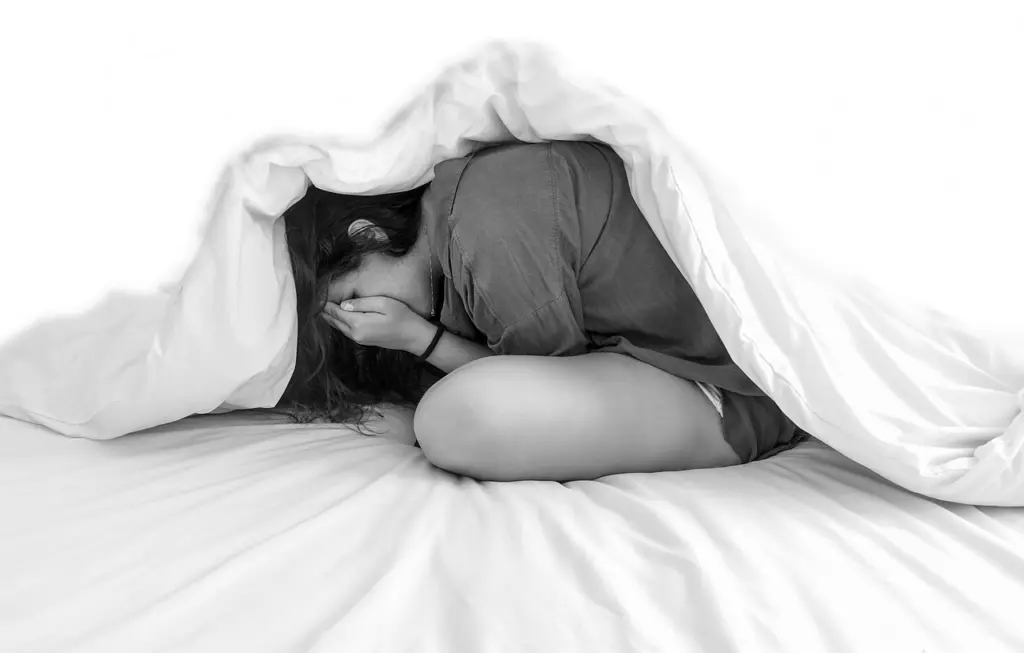
Defining Anxiety: The Invisible Storm
Anxiety, at its core, is a natural response to stress, a primal alarm system that gears us up to confront or evade danger. However, when this response becomes chronic or disproportionate to the triggering situation, it transforms into an anxiety disorder. It’s akin to an alarm that keeps sounding long after the danger has passed. This disorder manifests in various forms, from Generalized Anxiety Disorder (GAD) to Panic Disorders, each with its unique pattern of symptoms but united by the common thread of persistent, excessive worry.
The Ripple Effect: Symptoms and Impact
Anxiety is not just a storm in the mind; it sends ripples throughout the body. Physically, it can present as heart palpitations, muscle tension, or even digestive issues. Emotionally, it leads to feelings of apprehension or dread. Behaviorally, it might cause avoidance of certain situations. The impact of anxiety is holistic – it can dampen the vibrancy of life, turning everyday activities into insurmountable tasks.
The Anatomy of Anxiety: A Deeper Insight
To truly grasp the nature of anxiety, one must consider its anatomy. It’s a dance of neurotransmitters in the brain, a delicate balance that, when disturbed, leads to anxiety. Stress hormones like cortisol play a pivotal role, heightening the body’s alertness in a way that, over time, can become debilitating. This physiological aspect of anxiety is crucial, as it opens doors to understanding how physical therapies like Thai massage can influence these biochemical pathways.
Conventional Treatments for Anxiety: The Traditional Path
Conventionally, anxiety is approached with a combination of psychotherapy and medication. Therapies like Cognitive Behavioral Therapy (CBT) aim to rewire thought patterns, while medications such as SSRIs work on the chemical imbalances in the brain. However, these approaches, while effective, often overlook the holistic nature of anxiety, addressing the mind while neglecting the body’s role in this intricate dance of distress.
The Role of Complementary Therapies: A Holistic Approach
This is where complementary therapies like Thai massage step in, offering a more rounded approach to anxiety management. In the realm of holistic health, the belief is that physical interventions can have profound psychological benefits. By addressing the physical manifestations of anxiety, such as muscle tension and disrupted breathing patterns, these therapies can create a domino effect, easing mental stress.
The Unspoken Dialogue: Mind-Body Connection
The mind-body connection is a powerful but often underexplored aspect of anxiety treatment. This connection suggests that our thoughts and emotions can manifest physically, and conversely, addressing physical symptoms can positively impact our mental state. Thai massage, with its unique combination of stretching, pressure, and rhythmic movements, taps into this connection, potentially easing anxiety not just through physical relaxation but by fostering a sense of mental balance.
The Path Ahead: Exploring New Horizons
In this journey towards understanding anxiety, we open ourselves to new perspectives, exploring the less trodden paths of holistic healing. While traditional treatments hold their ground, therapies like Thai massage present a complementary avenue, one that harmonizes the physical and psychological aspects of anxiety. It’s a journey that acknowledges the complexity of anxiety and respects the multifaceted nature of its treatment.
As we delve deeper into the calming effects of Thai massage, we keep in mind this nuanced understanding of anxiety. It’s a condition that’s as varied as it is common, and addressing it requires a symphony of approaches, each playing its unique melody in the concert of healing.
The Essence of Thai Massage
Thai massage, a tapestry of healing interwoven with tradition, spirituality, and science, is not just a therapy but an art form that speaks to the deepest layers of the human body and mind. To understand its potential in easing anxiety, we must delve into its essence, exploring the roots from which this ancient practice sprang and the branches it has extended into modern wellness culture.
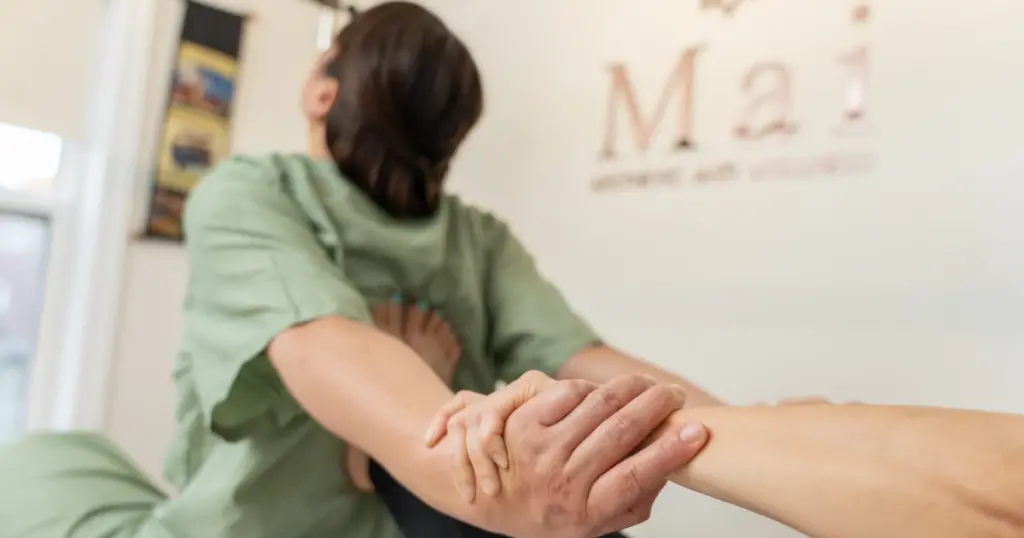
A Journey Through Time: The Roots of Thai Massage
The origins of Thai massage are as mystical as they are historical, tracing back over 2,500 years. Rooted in the practices of Ayurvedic medicine and influenced by traditional Chinese medicine, it is believed to have been founded by Jivaka Kumar Bhaccha, a physician to Buddhist monks. This lineage imbues Thai massage with a spiritual dimension, transcending mere physical manipulation to become a medium of healing energy.
The Dance of Healing: Techniques and Modalities
Thai massage is often described as a “dance” between the practitioner and the recipient. It is a choreography of movements that include:
- Rhythmic Pressing: Applying pressure along the body’s energy lines or ‘Sen’ to stimulate flow and release blockages.
- Dynamic Stretching: Gentle stretching and manipulation to enhance flexibility and relieve tension.
- Mindful Breathing: Encouraging deep, rhythmic breathing to aid relaxation and energy flow.
In this dance, the therapist uses their hands, elbows, knees, and feet, orchestrating a sequence that is as therapeutic for the mind as it is for the body.
Thai Barefoot Massage: A Unique Twist
Thai barefoot massage, a specialized form of the practice, involves the use of the practitioner’s feet to deliver deeper pressure. This technique, an embodiment of balance and strength, is particularly effective in addressing deep-seated muscle tension, often a physical manifestation of anxiety.
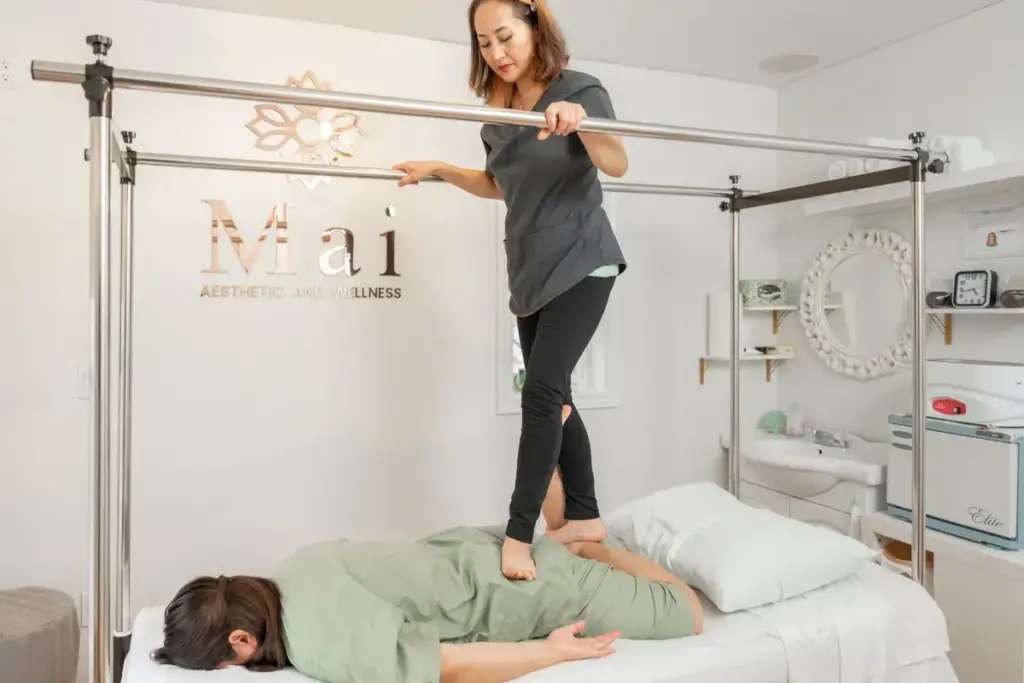
The Sen Lines: Pathways to Wellness
Central to Thai massage is the concept of Sen lines, akin to meridians in traditional Chinese medicine. These are believed to be channels through which life energy flows. The massage techniques aim to unblock and stimulate these pathways, restoring balance and promoting physical and mental well-being.
Thai Massage in the Modern Era: Adapting Tradition
While deeply rooted in tradition, Thai massage has evolved to embrace modern understanding of anatomy and physiology. This fusion creates a therapy that respects ancient wisdom while benefiting from contemporary scientific insights. It’s a blend that enhances the effectiveness of Thai massage in today’s stress-laden world.
Beyond Physicality: The Psychological Dimensions
Thai massage transcends physical therapy. Its approach to healing is holistic, acknowledging the interconnectedness of body and mind. The meditative aspect of the massage, combined with the mindful touch of the practitioner, can create a sense of emotional release and mental clarity.
Thai Massage: A Tapestry of Healing
At its core, Thai massage is a tapestry of various healing elements. It’s not just about relieving muscle tension; it’s about creating a space where physical relaxation can lead to mental tranquility. This essence, this intricate blend of tradition, technique, and modern adaptation, is what makes Thai massage a potential ally in the battle against anxiety.
In conclusion, Thai massage is not just a series of movements and pressures; it’s a holistic experience. Its ability to ease anxiety lies not just in its physical techniques but in its philosophy of balance and harmony. As we explore further the connection between Thai massage and anxiety relief, we carry with us this understanding of its essence – a blend of the ancient and the modern, the physical and the psychological, the art and the science.
Thai Massage and Mental Well-being
Thai massage, traditionally perceived as a physical therapy, holds within its folds the potential to nurture mental well-being. This ancient practice, with its unique blend of rhythmic movements and mindful techniques, transcends the physical realm, touching the realms of mental and emotional health. In this section, we explore how Thai massage influences mental well-being, supported by scientific evidence and insights into the body-mind connection.
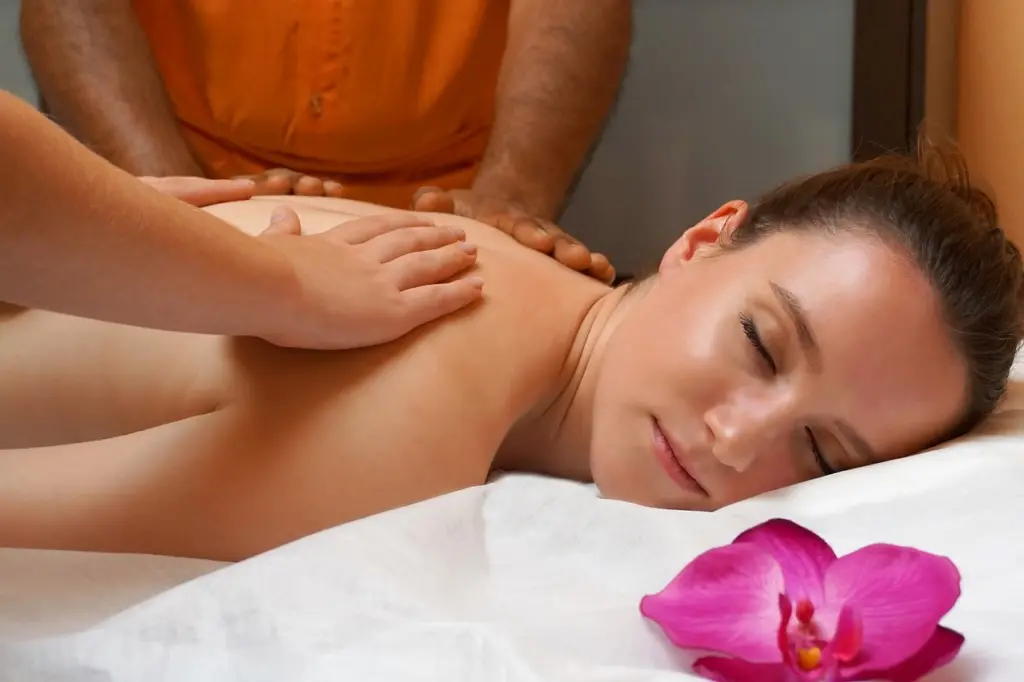
The Psychological Symphony: Thai Massage’s Impact on the Mind
Thai massage’s impact on mental health is akin to a symphony where each movement and pressure plays a critical role in harmonizing the mind. The rhythmic pressing and stretching in Thai massage are not just physical acts; they are conduits for psychological relaxation. The gentle, focused movements can coax the mind into a state of meditative calm, offering a respite from the relentless pace of anxiety and stress.
Mindful Presence: A Path to Emotional Balance
The practice of Thai massage encourages a state of mindful presence. Both the practitioner and the recipient are guided into a state of heightened awareness, where each breath and movement is deliberate and focused. This mindfulness, a core aspect of mental wellness, can provide a temporary escape from the spiraling thoughts that characterize anxiety, offering a window into a more tranquil state of mind.
Body-Mind Connection: Unlocking Emotional Release
The philosophy of Thai massage is rooted in the understanding of the body-mind connection. It acknowledges that emotional stress often manifests as physical tension. Through targeted techniques, Thai massage can unlock these physical manifestations, facilitating an emotional release that can be profoundly calming for individuals struggling with anxiety.
Scientific Evidence: The Tangible Proof
Recent studies have begun to shed light on the tangible effects of Thai massage on mental health. A notable example is the study titled “Immediate Effects of Traditional Thai Massage on Psychological Stress as Indicated by Salivary Alpha-Amylase Levels in Healthy Persons”, published on the NCBI website. This study investigated the immediate effects of traditional Thai massage on psychological stress in healthy individuals. Remarkably, it found that traditional Thai massage significantly reduced psychological stress, as indicated by salivary alpha-amylase levels. This evidence supports the theory that Thai massage can be an effective intervention for reducing psychological stress.
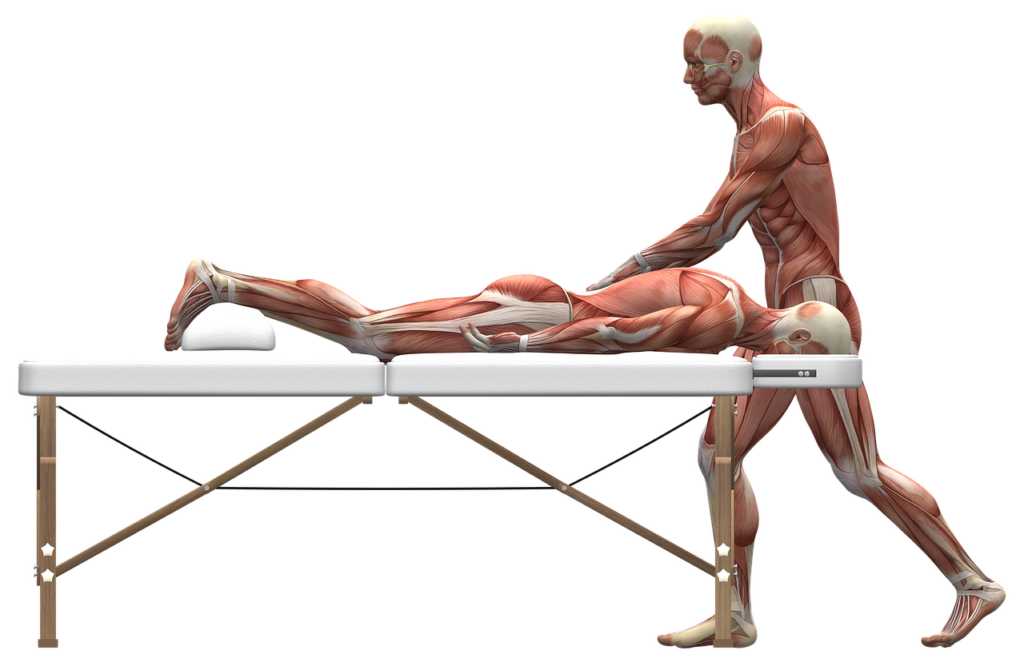
The Biochemical Ballet: Understanding the Impact
The study’s findings highlight a biochemical aspect of stress relief. Salivary alpha-amylase is an enzyme linked to the sympathetic nervous system’s stress response. The reduction in its levels post-Thai massage suggests a downregulation of this stress response, offering a biochemical perspective on how Thai massage facilitates relaxation and mental calm.
Beyond the Physical: The Psychological Ripple Effect
The implications of these findings extend beyond the physical relaxation often associated with massage. They point to a psychological ripple effect, where the physical act of massage triggers a cascade of biochemical changes that culminate in psychological stress relief. This evidence provides a valuable foundation for understanding the holistic benefits of Thai massage in managing mental health.
The Holistic Harmony: Thai Massage as a Mental Wellness Tool
In summary, Thai massage’s role in promoting mental well-being is multifaceted. It’s not just a physical therapy but a holistic practice that intertwines physical touch with emotional release and mindfulness. The growing body of scientific evidence further illuminates this connection, offering a deeper understanding of how this ancient practice can be a valuable tool in the quest for mental harmony, particularly in the context of managing anxiety.
Specialized Thai Massage Services for Anxiety
In the realm of therapeutic healing, Thai massage offers specialized services that cater specifically to the needs of those grappling with anxiety. These services, tailored to address various facets of anxiety, blend traditional Thai massage techniques with a nuanced understanding of mental well-being.
Thai Massage for Relaxation: Unwinding the Mind
The Thai Massage for Relaxation service is designed to create an oasis of calm in the midst of life’s storms. This service focuses on gentle, rhythmic movements and mindful breathing techniques, aiming to reduce the mental chatter that fuels anxiety. The deliberate and soothing strokes help in unwinding the tightly wound threads of stress and worry, guiding the mind towards a state of serene repose.
Thai Massage with Plai Oil from Wat Po: Soothing Pain to Soothe the Mind
Utilizing the renowned Plai Oil, sourced from the famous Wat Po temple, this service intertwines physical pain relief with mental relaxation. The oil, known for its anti-inflammatory properties, complements the massage’s ability to ease muscle tension. This dual approach addresses not just the physical symptoms often associated with anxiety, such as tension headaches and stiff muscles, but also aids in creating a holistic sense of well-being.
Office Syndrome Treatment: Tailored Relief for Modern Stress
Recognizing the unique stressors of modern work life, the Office Syndrome Treatment focuses on alleviating the physical manifestations of workplace stress. Concentrating on the neck, head, hands, and arms, areas most affected by prolonged computer use and poor ergonomics, this service aims to alleviate the physical discomforts that often accompany and exacerbate anxiety, thereby contributing to overall mental relief.
Complementary Services at Mai Thai Massage
At Mai Thai Massage, we understand that the journey to mental wellness is multifaceted. Therefore, we offer complementary services that enhance the benefits of Thai massage, providing a comprehensive approach to managing anxiety.
Facial Massage Services: The Face of Relaxation
Our range of facial massage services, including basic facial cleaning, face lifting, and back facial, are more than skin-deep treatments. They are designed to promote relaxation and alleviate stress. The gentle touch and focused attention on the facial muscles can help in reducing the psychological tension that often manifests in the facial area, contributing to an overall sense of calm.
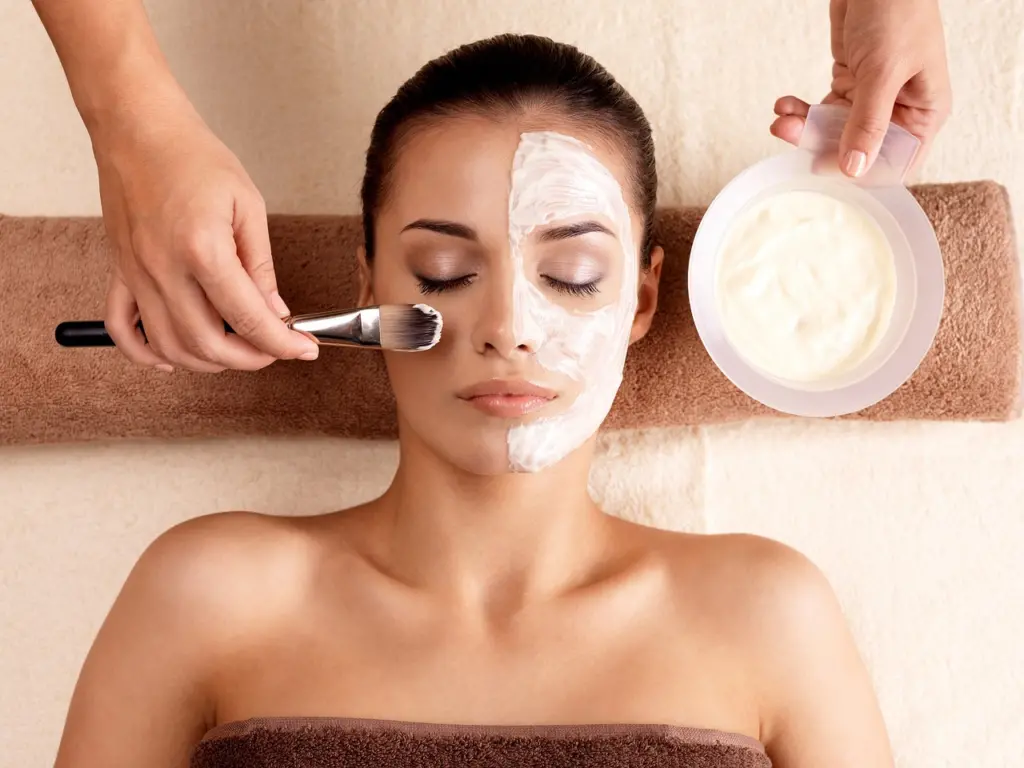
Swedish Massage Services: A Different Rhythm of Relief
While Thai massage is at the heart of our practice, we also offer Swedish massage services. This type of massage, known for its long, gliding strokes, offers a different rhythm and approach to relaxation. It can be an excellent alternative or complement to Thai massage, particularly for clients who may prefer a less intensive physical experience but still seek the benefits of stress relief and mental calm.
Practical Considerations
When considering Thai massage as a complementary approach to managing anxiety, there are practical aspects to keep in mind. These considerations ensure that the experience is not only beneficial but also safe and well-aligned with individual needs.
When to Consider Thai Massage for Anxiety
- Assess Personal Comfort: Thai massage involves close physical contact and deep stretching. It’s important to consider personal comfort levels with these aspects.
- Severity of Anxiety: While Thai massage can be beneficial for mild to moderate anxiety, those with severe anxiety should consult healthcare professionals for a comprehensive treatment plan.
- Physical Health Conditions: Certain health conditions may contraindicate or require modification of massage techniques. It’s crucial to discuss any health concerns with the massage therapist.
Consulting with Healthcare Professionals
Before starting any new therapy for anxiety, particularly if it’s a chronic or severe condition, consulting with healthcare professionals is essential. They can provide guidance on how Thai massage can fit into an overall treatment plan and identify any potential risks or contraindications.
In conclusion, Thai massage and its complementary services at Mai Thai Massage offer a unique and holistic approach to managing anxiety. However, it’s important to approach this therapy with mindfulness of individual needs and in consultation with healthcare professionals. With these considerations in mind, Thai massage can be a valuable tool in the journey towards mental well-being.
Conclusion
As we conclude this exploration into the calming effects of Thai massage, it’s evident that this ancient practice holds significant potential in the realm of mental well-being, particularly in managing anxiety. Through its unique combination of rhythmic movements, mindful breathing, and targeted pressure, Thai massage transcends the conventional boundaries of physical therapy, touching the delicate fabrics of mental and emotional health.
The journey through the intricacies of Thai massage reveals a therapy that is much more than a series of physical manipulations. It is a holistic experience that nurtures the mind-body connection, offering a haven of tranquility in the turbulent seas of anxiety. The specialized services at Mai Thai Massage, from relaxation-focused treatments to the targeted relief of Office Syndrome, demonstrate a deep understanding of the varied manifestations of anxiety in the modern world.
A notable affirmation of Thai massage’s efficacy in reducing psychological stress comes from the study published on the NCBI website, which found that “traditional Thai massage significantly reduced psychological stress as indicated by salivary alpha-amylase levels in healthy persons.” This scientific evidence underscores the potential of Thai massage as a therapeutic intervention, aligning ancient wisdom with modern scientific understanding.
As we integrate these insights, it becomes clear that Thai massage, with its rich heritage and evolving practices, offers a unique approach to anxiety management. It invites us to view mental well-being through a broader lens, one that encompasses the physical, emotional, and spiritual aspects of our existence.
In embracing Thai massage as a complementary therapy for anxiety, it is essential to approach it with a sense of mindfulness and in consultation with healthcare professionals. Each individual’s journey with anxiety is unique, and Thai massage can be a valuable part of a holistic treatment plan, tailored to meet personal needs and circumstances.
In summary, Thai massage emerges not just as a physical therapy but as a holistic practice that soothes the mind, calms the body, and uplifts the spirit. It stands as a testament to the timeless wisdom of traditional healing practices and their relevance in our contemporary quest for mental and emotional balance.
